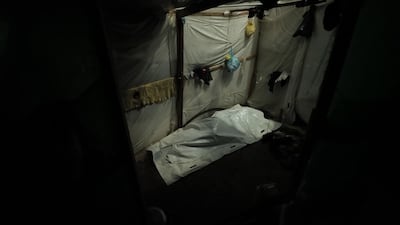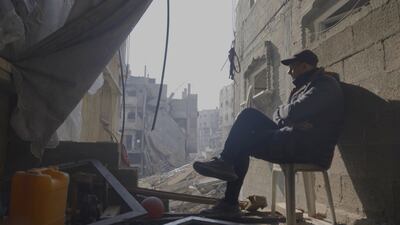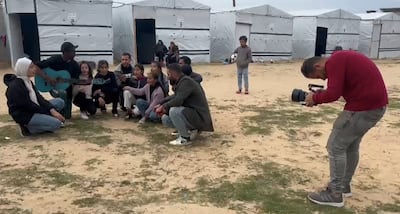In Hell’s Heaven, a short film directed by Karim Satoum, a man wakes up in a body bag in Gaza. At first, he is unsure of how he ended up in the thick plastic reserved for the dead. He unzips himself from the bag, and begins walking amidst refugee tents set against a demolished landscape, trying to recount his previous day. He had been sleeping on bare concrete, shivering from the cold, he remembers. He had gone to one of the organisations that offered free washing and burial for the dead. He had asked for a bag, and when initially denied, he had argued, saying: “Don’t I get a bag if I was martyred? I might as well make use of it now.”
And so, he had been given the bag. The thick plastic was his sole respite from the cold, a slim victory in his displacement, his “heaven in hell".

Satoum’s film is one of the works in From Ground Zero, a collection of 22 short films by Gazan filmmakers. The films offer an evocative view of the current reality in Gaza. It aims to highlight the tragedies in the Palestinian enclave, and the measures people have to take to survive.
A recent report by the Lancet medical journal gave a sombre overview of the Israel-Gaza war, suggesting that the death toll in the Palestinian enclave was far more than initially perceived. The report claimed it was “not implausible” that more than 186,000 people have died since the Israeli bombardment began on October 7, considering both direct causalities and indirect causes, such as sickness and starvation.
The toll is a harrowing number to consider, and yet it can only communicate so much of what is actually happening on the ground. From Ground Zero aims to provide a more personal perspective of the situation in Gaza, highlighting stories told by Gazans themselves.
From Ground Zero, spearheaded by Palestinian filmmaker Rashid Masharawi, marked its official world premiere at the Amman International Film Festival. The project was initially expected to be shown at the 77th Cannes Film Festival, but was then pulled. Masharawi then led a protest screening in the French resort town with no official backing from Cannes.
Speaking during the film’s premiere in Amman last week, Masharawi said he was happy that the film finally had its official screening and that his mission is to spread it across the world. “These films were written, filmed and produced during the war, and during the destruction that is still ongoing,” Masharawi said. “It was a very difficult period. A large number of the filmmakers had to move from place to place during their projects. Some had their houses bombed, for instance, and had to live in a tent. Others lost half of their family and yet continued the project. We decided that we wanted to tell not just personal stories, but we wanted to do them cinematically at the same time.”

Masharawi and the team of 22 filmmakers succeeded in fulfilling this aim. The stories presented in From Ground Zero vary across a spectrum of emotions, ranging from resilience and tragedy to hope and finding joy in unlikely places. They also incorporate unexpected elements, including animation, puppetry and stop-motion.
In Sorry Cinema, Ahmed Hassouna, a veteran filmmaker in the Gazan community, offers a letter of apology to the art form, saying he is unable to continue working as he has to ensure his family’s survival. The film is a moving tribute to cinema, as much as it is a poignant perspective of a creative’s life amidst war. At first, Hassouna was not able to find it within himself to make the feature, even though doing so would mark his worldwide debut as a filmmaker.
“Ahmed never had the opportunity to showcase his films at festivals or even see his films on the big screen,” Masharawi said. “When I approached him about the project, I told him now’s your chance and that I guarantee it would be screened all over the world. He said he didn’t want to do it. He had lost his brother a few days before. He also lives in North Gaza, where ambulances or civil defence can’t access. The only way food and medical provisions can reach them is through air drops.”
At first, Masharawi did not insist. However, after some time had passed, Masharawi knew that his colleague had a valuable perspective to offer and suggested that he address his reluctance to work on a project through a film.
Hana Eliwa, meanwhile, underscores a different aspect of living life in war. Masharawi said Eliwa didn’t want to pursue stories of destruction and tragedy, but instead wanted to focus on the human tendency to seek light in the darkest of circumstances. Her short film, No, does just that. It features a group of Gazan youths as they sing songs of resistance and hope, offering an uplifting streak of joy in a landscape marred by devastation.
Then there are works, such as Recycling, which show how people have to make do with scarce resources. The film, directed by Rabab Khamis, revolves around a mother, who utilises a single bucket of water to hydrate her children, bathe them, clean the floors of their house and do the laundry.

Masharawi says the filmmakers who participated in the project also taught each other techniques to adapt to the situation. In most of the films, the dreadful sound of overhead drones and planes can be heard. For voice-overs, Masharawi suggests that filmmakers isolate themselves in a car, shutting the window to record audio as cleanly as possible.
“When I said this to one of the filmmakers, she instead offered a more viable solution,” Masharawi said. “She suggested going inside a closet and lining it with a rug and make an insulated space. When she sent the audio, it was studio quality, even if it was recorded in a tent. I then shared this technique with other filmmakers.”
As poignant are the films that didn’t make it to the collection. Taxi Wanissa by Etimmad Wishah, for example, revolves around a taxi driver who transports people and goods around Gaza with a caravan and mule. Midway through, the footage stops and Wishah herself takes the screen, saying she was unable to complete the project, as on the third day of filming, tragedy struck when a member of her family was killed in an airstrike.
“No one could ask her to complete the film,” Masharawi said. “We told her to forget about the film, and to look after herself.” Weeks later, the team decided to supplement the footage with a statement of Wishah to shed light on what had happened to the project.
“Sadly, we had several projects that did not make it,” Masharawi said. “Some stories couldn’t make it because the filmmaker’s footage, his computer and everything he had was bombarded. For instance, there was a film about a woman who goes to the hospital as she is about to give birth. But there is no space in the hospital for her. The hospital is filled with death and there is no place for new life.”
“All these stories are part of reality,” Masharawi said.


